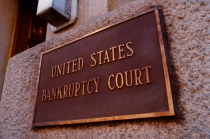
U.S. bankruptcies increased 35% over the last year with 1.3 million bankruptcy cases filed between July 2008 and June 2009 as the recession took a steep toll on households and businesses, said the Administrative Office of the U.S. Courts on Thursday. Leading that trend, foreclosure activity jumped 7% in just one month from July to June 2009 and nearly 32% from a year ago.
But all is not lost. According to Marketplace senior business correspondent Bob Moon, the economy is “not as bad as it looks.” What happened last fall, says Moon is that companies in a near frenzied panic halted production and laid off workers without fully considering the consequences. This knee-jerk reaction ‘froze’ the market and prevented healthy consumers from spending. “They stopped buying cars, and houses, and other things for a while,” says Moon. “If the Great Depression never comes, [the businesses] are going to have to rehire some or most of those people again.” That’s the good news.
Bankruptcies by the Numbers
- Business bankruptcies, like the high-profile collapse of General Motors Co and Chrysler LLC, totaled 55,000, while non-business filings totaled 1.25 million, the courts office said.
Filings increased among all types of bankruptcies.
- Chapter 7 filings, which require debtors to sell their non-exempt property, rose 47 per cent to 908,000.
- Chapter 13 filings, which enable wage earners to come up with a plan to repay debtors, rose 12 per cent to 384,000.
- Chapter 11 filings, used to reorganize bankrupt businesses, rose 91 per cent to 14,000.
- Chapter 12 filings, used by farmers or fishermen, rose 34 per cent to 422.
— REUTERS
Let’s look at the last big U.S. recession in 1982. A record 10.8% were unemployed, yet the U.S. economy saw 8% growth over the year-and-a-half post recession. “If that happens this time, and we have no reason to believe that it won’t, we may also see another slump when the stimulus bill comes due,” continues Moon.
In our practice, we’re seeing record numbers of bankruptcies. These are not individuals or families who are deadbeats. They didn’t charge credit cards or buy a home with the intention of never repaying those debts. These are upper-middle and middle class Americans who through a series of circumstances beyond their control found themselves at the brink of financial ruin. One lay-off, one breadwinner taken ill and within a few short months, they are facing foreclosure and bankruptcy. In all honesty, we are all very close to financial hardship. Many of us save too little, spend too much, and carry far greater debt than we can safely repay. When tragedy strikes, an illness is diagnosed, or a job is lost, the entire house of cards crumbles and there seems like no way out.
What can you do to help yourself through this recession and avoid becoming a bankruptcy statistic?
- Write a household budget. If you have a budget but haven’t revisited it in a while, take the time to pull all of your bills and expenses and rework the numbers. If you’ve never written a budget, get a pencil, paper, monthly bills and receipts and start writing. Track of all expenses for a month, even your morning coffee and seemingly small incidental purchases. Now calculate what you spend versus what you earn. Do the numbers add up? If you’re seriously over extended, now is the time to consider what you can cut back and what must be kept.
- Be realistic. Your budget will only work if you are honest with your spending. That doesn’t mean that you need to live without any spending. What a budget does is help you to better manage your expenses so you have funds for what you truly need or want.
- If you’re behind, don’t wait. Take immediate action. If circumstances have left you overdue on monthly bills or with mounting late fees, pick up the phone and talk with your creditors. Many creditors are willing to work out more affordable repayment options rather than see you default on your debts.
- Work on the cash-based system. Put away or close most of your major credit cards (keep the one with the lowest interest rate) and replace them with a single checking account debit card. Purchases with debit cards are deducted directly from your checking account and will save you hundreds or even thousands in annual interest payments and fees.
We need to take a lesson from our parents and grandparents. They were great at cash-only living. Each week a few dollars would be taken from the budget and placed in savings. Over a few months or even a year, the money would accrue until enough was saved for that special purchase. The credit card industry is virtually unregulated and has designed a system to ensure that as much as possible of your monthly payment goes to interest and fees. Once they get their hooks into you, they won’t let go. If you can’t afford it now, don’t buy it on credit. Be patient and save for it. Otherwise, you’re gambling that your income will remain the same, no illness will befall you, and your finances will remain unimpaired.
